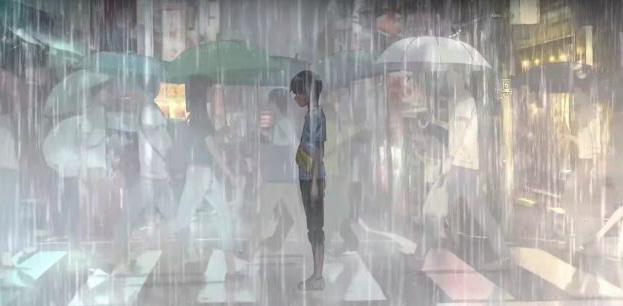
4 minute read
WEATHERING SHINKAI’S NAME
RICHARD HO - Guest Writer, 3rd Year, Economics
"I do like Tenki no Ko, it’s simply overrated in my opinion, and feels almost like it should’ve come from a different director, in the same vein as I Want to Eat Your Pancreas."
Advertisement
Originally published on Mar. 19, 2020

Makoto Shinkai has become the next big name in the anime industry, big enough that you don’t have to be an otaku in Japan to know his name. However, his career didn’t begin with his breakout success of Kimi no Na wa in 2016; in fact, he has been crafting well-regarded short films for decades. Shinkai’s earlier works, written and sometimes even animated by himself, often have a surreal, melancholic, or tragic feel to them, and often prominently feature communication as a theme. For example, Voice of a Distant Star explored the effects of time on communication and differential experiences of a young couple in a mecha-styled future, almost serving as a deconstruction of the genre at the same time. 5 Centimeters per Second showed the evolution of communication as technology changes, from a time where telephones and email weren’t common to our modern age, and how it affects how close we are to others. Garden of Words ironically did not have much dialogue in it, instead choosing to portray emotions through body language, atmosphere, and silence, making the few conversations all the more weighted. Even in Kimi no Na wa, we see two teens communicating across time, space, and even mortality, taking a peek into each other’s lives and leaving messages behind, and eventually deciding what was important enough to leave as a final message.
However, in Tenki no Ko we see a shift towards a broader audience and more of a deviation from Shinkai’s previous works. The Ghibli style is in full effect, the scenes are often focused on action and sakuga moments, and the setting grounded in our reality brings with it echoes of company promotions. The trait this movie lacked the most was subtlety; foreshadowing was rather obvious, symbolism was overemphasized instead of letting the viewer notice them for themselves, and you can’t forget about how a McDonald’s burger is the best meal you’ve ever had in your entire life. There was little struggle over communication; secrets and thoughts flowed relatively freely, there was not much dramatic irony to play at the audience’s heartstrings, and even Hina’s role as a weather miko does not see her ever communicating with the life living in the skies above. And rather than continue with Shinkai’s common endings of bittersweetness and acceptance, he gives us a world where actions don’t have consequences and the protagonists have a strictly happy ending. Hodoka makes a brash decision to pull Hina from the skies, regardless of the consequences--which ended up becoming the flooding of Tokyo. As the end scene begins to roll, you hear his voiceover and you think you know what’s coming: his actions have caused devastation and the near collapse of Japanese society, and people are desperately trying to survive and rebuild in the new world they find themselves in. Instead, we see a world where firing a pistol at a police officer and resisting arrest gets a light slap on the wrist, where everyone has adapted to their new life perfectly, where our side protagonists succeed and our main protagonist reunites with the girl. No consequence is given to breaking laws, dooming the world; instead, we are taught that true love conquers all, and those who help will be rewarded, and that is distinctively not Shinkai.

I ask the reader to consider an alternative ending, and see which gives a little more depth. Our “hero” is sent back home, and continues with his voiceover as usual. Japan is still flooded, and the economy and infrastructure of the country is devastated. Wherever Hodoka goes, his reputation as the one who caused the eternal rain follows him in the background, alone as he started the movie as. When he meets with Keisuke, he is welcomed, though Keisuke obviously seems to have something he wants to say but can’t quite bring himself to do it. As Hodoka leaves, Keisuke looks at a picture of his daughter, and the viewer knows he’ll never be able to visit her again due to her asthma. Finally, he finds Hina, and we see the same reputation has followed her as well, as she dons her hood to prevent others from recognizing her. He calls out, and she turns to him. A tear rolls down her face to join the rain, and she gives a small sad smile before the screen cuts to black. Is she happy to see him? Or does she regret what they did?





